- Home
- Natalia Ginzburg
Family Lexicon Page 6
Family Lexicon Read online
Page 6
One day my mother and Terni were standing in the vestibule and my mother was crying. They were saying that Galeotti was dead.
Those words, “Galeotti is dead,” have always stayed with me. In my life up until then, no one we were close to had died. From then on death was inextricably linked in my mind to that cheerful figure dressed in gray wool who came to visit us during the summer in the mountains.
Galeotti had died suddenly of pneumonia.
Many years later after penicillin was discovered my father often said, “If there’d only been penicillin in poor Galeotti’s day he wouldn’t have died. He died of streptococcal pneumonia. Penicillin can cure that now.”
As soon as anyone died my father immediately added to his name the word “poor” and he became angry with my mother if she didn’t do the same. This addition of “poor” was a long-held tradition in my father’s family. My grandmother, when she spoke of her dead sister, invariably said “poor little Regina,” and never referred to her in any other way.
Within an hour after his death, Galeotti had become “poor Galeotti.” My grandmother was told of his death with great delicacy because she, having always had a great fear of death, was not at all pleased that death was anywhere in her vicinity and among people she knew.
After Galeotti’s death, my father said he no longer got much joy out of making ascents. He still made them anyway but not with the same pleasure. He and my mother would talk about the time when Galeotti was still alive as a time of happiness and joy when they were younger and when the mountains still held some fascination for my father, a time when fascism seemed as if it would soon be a thing of the past.
•
“How cute, how nice Mario is!” my mother said brushing Mario’s hair as soon as he had gotten out of bed, his eyes tiny, almost invisible from sleep.
“The Brot shot in the pot,” Mario said with a distant smile as he stroked his jaw. It was his way of announcing that he wasn’t in a sulk and would consent to chat with my mother, my sister, and me.
“How cute Mario is, how handsome!” my mother said. “He looks like Silvio! He looks like Suess Aja Cawa!”
Suess Aja Cawa was a famous movie actor at the time. Whenever my mother saw the Mongolian eyes and high cheekbones of Suess Aja Cawa on the screen, she would exclaim, “It’s Mario! It’s really him!”
“Don’t you think Mario is handsome?” she asked my father.
“I don’t think he’s that handsome. Gino’s better-looking,” my father answered.
“Gino’s handsome too,” my mother said. “How appealing Gino is! My little Gino! I only like my own children. I only have a good time with my children!”
And when either Gino or Mario had on a new suit made by Maccheroni the tailor, she’d hug him and say, “Whenever one of my sons wears a new suit, I love him even more.”
In our family, we had heated discussions over how ugly or good-looking someone was. A persistent topic of discussion was whether a woman named Gilda, the governess in a family we were friendly with in Palermo, was beautiful or not. My siblings maintained that she was ugly, her nose a variation on a dog’s snout, but my mother said she actually possessed extraordinary beauty.
“Nonsense!” my father shouted, then laughed one of his thundering laughs that echoed throughout the apartment. “That woman is in no way beautiful!”
And we had endless discussions over whether the Colombos or the Cohens, friends we’d met in the mountains over the summer, were uglier.
“The Cohens are uglier!” my father shouted. “You want to put them in the same category as the Colombos? There’s no comparison! The Colombos are better-looking! You’re blind if you can’t see that! You lot are blind!”
Of his various cousins called either Margherita or Regina, my father would say they were very beautiful. “As a young woman Regina,” he’d begin, “was a great beauty.”
And my mother would say, “But it’s not so, Beppino! She had a jutting chin!”
She’d then demonstrate Regina’s protruding chin by sticking out her own chin and lower lip, and my father would get angry. “You don’t understand a thing about beauty and ugliness! You say that the Colombos are uglier than the Cohens!”
•
Gino was serious, studious, and serene. He never hit either of his brothers. He was a good mountain hiker. He was my father’s favorite. My father never called him a “jackass.” He did say, however, that Gino “didn’t lend his gear.” Lending an ear in our family was called “lending gear.” Gino, in fact, didn’t lend much gear because he was always reading and when anyone spoke to him he responded in monosyllables without lifting his eyes from his book. If Alberto and Mario were fighting, he didn’t move a muscle but continued to read and my mother would have to call out to him and shake him in order to get him to break them up. While he read he ate bread very slowly, nibbling away at one roll after another. He would ingest almost a kilo of bread after lunch.
“Gino,” my father yelled, “you don’t lend your gear! You never tell us anything, and don’t eat so much bread or you’ll get indigestion!”
In fact, Gino often had indigestion: he became red in the face, sullen, and his protruding ears turned fiery red.
“Why does Gino look like that?” my father asked my mother, waking her up in the middle of the night. “Why does he have that pout? Why does he have that moon face? Do you think he’s in some kind of trouble?”
My father never could tell by the look on his children’s faces if they were suffering from indigestion. He never recognized indigestion when he saw it, suspecting instead mysterious troubles with women, with coquettes as he would call them.
Since Gino seemed to be the most serious, well-mannered, and presentable of his children, my father would take Gino to the Lopezes in the evening sometimes. But Gino had the unfortunate habit of falling asleep after he ate and he also fell asleep at the Lopezes in an armchair while Frances was talking to him. His eyes became small, his head gently nodded, and after a little while he was asleep with his hands on his lap and the trace of a blissful smile on his lips.
“Gino!” shouted my father. “Don’t fall asleep! You’re falling asleep!”
“You lot,” my father would say, “I can’t take you anywhere.”
•
On one side there was Gino and Rasetti, the mountains, the “black schists,” the crystals, the insects; on the other was Mario, my sister Paola, and the Ternis who detested the mountains and loved stuffy rooms with the windows closed, dimmed lights, and cafés. This latter group loved the paintings of Casorati, the theater of Pirandello, the poetry of Verlaine, Gallimard editions, Proust. They were two incommunicable worlds.
I didn’t know yet which side I would choose. They both attracted me. I hadn’t yet decided if, in my life, I wanted to study beetles, chemistry, or botany, or if, instead, I would paint pictures or write novels. In Rasetti’s and Gino’s world everything was clear, everything would unfold beneath the light of the sun, everything was plausible and without mysteries or secrets. The discussions, on the other hand, that Terni, Paola, and Mario had while sitting on the couch in the living room were tinged with mystery and obscurity, arousing in me a combination of fear and fascination.
“What does Terni have to tittle-tattle about with Mario and Paola?” my father asked my mother. “They’re always tattling in the corner. What is all this taradiddling?”
“Taradiddling,” for my father, meant passing secrets, and he couldn’t stand to see people off in a corner talking without his knowing what they were saying.
“They must be talking about Proust,” my mother told him.
My mother had read Proust and she, like Terni and Paola, loved his work enormously, and told my father that this Proust was very fond of his mother and his grandmother and had asthma and couldn’t sleep and because noise bothered him, he had covered the walls of his room with corkboard.
My father said, “He must have been a jackass!”
My mother ha
dn’t chosen either one of those two worlds but lived a little in one and a little in the other, residing happily in each because her curiosity never let her reject anything but rather fed on all manner of food or drink. Instead, my father looked upon all new and unfamiliar things with menace and suspicion, and feared that the books Terni brought into our apartment weren’t “suited.”
“Is that suited for Paola?” he asked my mother, leafing through À la recherche and reading a phrase here and there. “It must be very boring stuff,” he said tossing the book away, to some extent appeased by the fact that it was “boring stuff.”
Terni brought us reproductions of Casorati’s paintings and my father couldn’t stand them. “Dribbledrabs! Doodledums!” he’d say. Painting of any kind didn’t interest him in the slightest. He went to art museums with my mother when they were traveling. He would grant old masters like Goya or Titian some legitimacy since they had become universally recognized and exalted. He desired those museum visits to be extremely brief, however, and he didn’t let my mother pause in front of the paintings.
“Lidia, come on, let’s go!” he said, dragging her away.
When traveling he was always in a great hurry.
My mother also, however, didn’t have much interest in painting but she knew Casorati personally and thought him charming. “What a handsome face Casorati has,” she often said. Since she thought his face handsome, she also approved of his paintings.
“I’ve just been to Casorati’s studio,” my sister said on arriving home.
“How charming Casorati is! What a handsome face!” my mother would say.
“Why the hell is Paola going to Casorati’s studio?” my father asked, frowning suspiciously. My father was always afraid that we would get ourselves into “trouble,” meaning we would find ourselves entangled in some nefarious love intrigue, and he perceived threats to our chastity everywhere.
“It was nothing. She went with Terni. They went to say hello to Nella Marchesini,” my mother explained.
The mere mention of Nella Marchesini’s name reassured my father. She was my sister’s childhood friend and my father knew her well and respected her. Nella Marchesini studied painting with Casorati and my father accepted her presence at his studio as legitimate. Terni’s companionship, on the other hand, would never have reassured him because my father didn’t consider him to be a reliable chaperone for us.
“What a lot of time that Terni wastes,” he observed. “He’d be better off finishing his work on tissue pathology. I’ve been hearing about it for a year.”
“You do know that Casorati is an antifascist,” my mother said.
Over time antifascists were becoming increasingly rare and whenever my father heard of one he was immediately cheered up.
“Ah, he’s an antifascist. Is that so?” he said with interest. “But his paintings are such great doodledums! How can anyone possibly like them!”
Terni was very good friends with Petrolini and when Petrolini came to Turin for a series of performances, almost every evening Terni had complimentary seats in the orchestra, which he gave to my mother and siblings.
“How wonderful!” my mother would say during the day. “Tonight we’re going to see Petrolini again! And we’ll be sitting in the orchestra. How I love to go to the theater and sit in the orchestra. Petrolini is so charming and so witty! Silvio would have liked him a great deal too!”
“Ah, so you’re leaving me all on my own again tonight,” my father would say.
“Why don’t you come too, Beppino?” my mother would say.
“No way,” my father yelled. “Imagine me coming to see Petrolini! I couldn’t care less about Petrolini! He’s a clown!”
“We went with Terni to say hello to Petrolini in his dressing room,” my mother said to my father the following day. “Mary came too. They’re very good friends with Petrolini.”
In my father’s estimation, Mary, Terni’s wife, was a reliable chaperone and he found her presence reassuring because he harbored for her the highest possible admiration and respect. Mary’s presence gave a legitimacy and decorum to those evenings at the theater and maybe even a little to Petrolini himself. Still, my father continued to scorn Petrolini imagining that in order to perform one was required to wear a false nose and bleach one’s hair.
“I don’t understand why Mary is such good friends with Petrolini,” he would say with profound astonishment. “I don’t understand why she likes to go see Petrolini so much! I understand why Terni and the rest of you like him because you lot love nitwitteries! How is it that they are such good friends with Petrolini? There must be something shady about him!”
For my father, an actor, and especially a comedian who made funny faces onstage in order to get the audience to laugh, was undoubtedly “a shady character.” My mother reminded him, however, that his brother Cesare had lived his life in the company of actors and had married an actress. All those people his brother hung around couldn’t have been “shady characters” even if they wore costumes onstage or dyed their hair or mustaches.
“And Molière?” my mother said. “Molière, wasn’t he also an actor? You’re not going to tell me that he too was a shady character!”
“Ah Molière!” my father said. He had the greatest respect for Molière. “Molière is fabulous! Poor Cesare had a passion for Molière! But you couldn’t possibly be placing Molière and Petrolini on equal footing, could you?” he shouted, then laughed one of those thundering laughs of his, heaping on Petrolini his most intense scorn.
Usually it was my mother, Paola, and Mario who went to the theater, and they frequently went with the Ternis who, if they didn’t have complimentary orchestra seats as they did for Petrolini, had box seats. They were always the Ternis’ guests so my father wasn’t able to say, “I don’t want you throwing money away on the theater,” and instead looked benevolently upon my mother’s evening out with Mary.
Nevertheless, my father would say to my mother, “You’re always going out and having a good time and leaving me behind.”
“But every evening you keep yourself closed up in your study,” my mother said. “You don’t pay any attention to me. You don’t keep me company.”
“What a jackass!” my father said. “You know I’m very busy. I don’t have time to waste with all of you. And besides, I didn’t marry you to keep you company!”
In the evenings my father worked in his study. He corrected the proofs for his books and pasted in illustrations. Sometimes, though, he read novels.
“Is that novel good, Beppino?” my mother would ask.
“Hardly. It’s a bore. A nitwittery,” my father responded with a shrug.
He read, however, with rapt attention while smoking his pipe and brushing the ashes from the page. When he returned from a trip he always brought home with him a few crime novels that he’d bought at the station bookstalls and would finish reading them in his study in the evening. They were often in English or German, perhaps because it seemed to him less frivolous to read that sort of novel in a foreign language.
“A nitwittery,” he said, shrugging his shoulders, and he’d continue reading until he’d read the very last line.
Later, when Simenon’s novels began to appear my father became his devoted reader. “He’s really not bad, Simenon,” he’d say. “He describes that French province really well. He really describes French provincial life very well!”
But during the era of via Pastrengo, Simenon’s novels didn’t yet exist. The books my father brought home from his trips were small editions with glossy covers showing female characters with their throats slit. My mother, finding them in the pocket of his coat, said, “Will you look at what nitwitteries our Beppino reads!”
•
Under Terni’s influence, an alliance had developed between Paola and Mario that persisted even when Terni wasn’t around. As far as I could tell, it was an alliance founded on their worship of melancholy. Together or separately, in meditative solitude Paola and Mario took
melancholic walks at dusk. They read sad poetry to each other, reciting poems aloud in sorrowful whispers.
As I remember, Terni wasn’t at all prone to such melancholy. He wasn’t especially attracted to silent, abandoned places, nor did he ever take solitary, melancholic walks. Terni lived in a perfectly normal manner at home with his wife, Mary; the nanny, Assunta; and his children, Cucco and Lullina, whom he and his wife spoiled, becoming ecstatic at the mere sight of them. But Terni had introduced into our family a taste for melancholy and melancholic moods just as he had brought us La Nouvelle Revue française and the Casorati reproductions. Paola and Mario had welcomed his influence, but not Gino, whom Terni didn’t like, Gino disliking Terni just as much. Neither did Alberto, who cared nothing for poetry or painting, having never written another line of verse after “The old maid / With no titties.” Playing soccer had become his sole interest. And neither did I because Terni was nothing more to me than the father of Cucco, a friend I played with now and again.
Lost in their melancholy, Paola and Mario exuded a profound intolerance for my father’s despotism and for our family’s simple and austere habits. It seemed they felt themselves exiles in our family, dreaming of an entirely different homelife and lifestyle. Their intolerance manifested itself in great pouts and moon faces, listless looks and impenetrable expressions, monosyllabic responses, angrily slammed doors that shook the building, and curt refusals to go to the mountains on Saturday and Sunday. As soon as my father left the room, they immediately cheered up because their intolerance was reserved exclusively for him and not for my mother. They listened to her stories and together they recited aloud the poem about the flood: “For many days everyone trembled where they stood!”
Mario wanted to study law but my father had forced him to enroll in business economics, believing—I don’t know why—that the law department was not very serious and a law degree wouldn’t lead to a secure future. Mario held a silent grudge against him for years. As for Paola, she was generally unhappy with her life and wanted very much to own more clothes. Those she did own she disliked, having deemed them masculine and unflattering. My father insisted our clothes were made by Maccheroni, a man’s tailor, who was inexpensive, or at least so my father thought. Sometimes my mother would resort to her seamstress, Alice, but claimed she wasn’t any good.

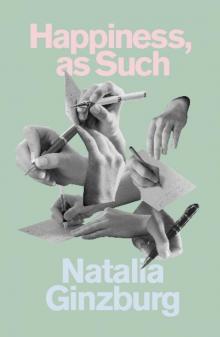 Happiness, as Such
Happiness, as Such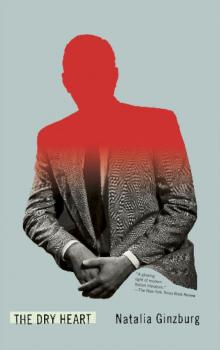 The Dry Heart
The Dry Heart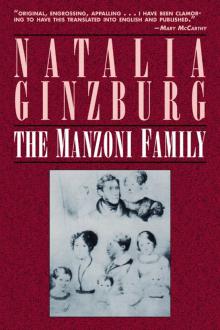 The Manzoni Family
The Manzoni Family A Place to Live
A Place to Live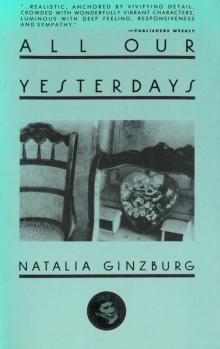 All Our Yesterdays
All Our Yesterdays The Little Virtues
The Little Virtues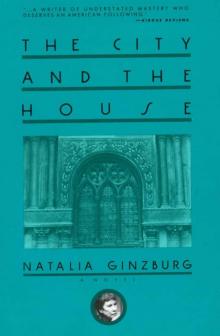 The City and the House
The City and the House The Road To The City
The Road To The City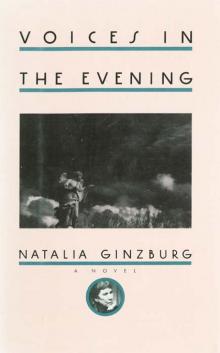 Voices In The Evening
Voices In The Evening